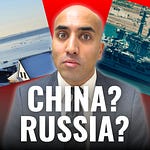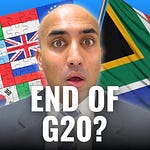As the dust settles from the showdown between Trump and Harris on Tuesday, many of us are trying to assess what the debate means for the election. Such unscripted interactions, outside of familiar and comfortable settings, are rare moments. They present perhaps the most clarity on what a candidate will do on the most consequential issues.
While much of the focus is on the impact on the US domestically, from voters to the economy, the debate has an equally significant meaning for the world stage.
As the candidates reminded each other of what they did wrong or what they said, geopolitics was not far-removed. It made multiple quick appearances and quietly loomed around the broader discussions.
Below are six takeaways as to what the Trump-Harris debate means for world affairs.
1. ENERGY SOVEREIGNTY
Whether it was Russia supplying energy to Europe or America doubling-down on fracking, energy came a close second to immigration as the most discussed issue. As Trump and Harris sparred over who would support the US energy industry more, it became clear that conversations about America’s energy security have evolved into conversations about America’s “energy sovereignty.” Through domestic sources (i.e. fracking) and friendly foreign sources (i.e. not Russia), the US wants to change its energy matrix in a way that guarantees it won’t face a situation like Europe today (with Russian energy) or America in the past (like with the 1973 oil embargo). Whoever wins will further redesign the American energy supply chain, including building on new achievements, like America being the world’s biggest exporter of LNG, converging US energy goals and foreign policy goals in a new way.
2. CLEAR THREATS
The four nations mentioned the most were China, Russia, Iran, and North Korea. It is clear that the new “Axis of Evil,” a phrase that the US speaker of the house Mike Johnson coined in a speech, is becoming the predominant lens which American politicians, including the candidates, look at the world through. For the US, these nations are no longer singular, compartmentalized challenges with clear outlines. Increasingly, as the debate eluded to, these nations are integrating and becoming interconnected, representing a multi-front threat to the US and its allies, from economy to technology to security. These nations will increasingly be treated as “one” regardless of who wins.
3. TECH WAR
When China was raised, far less than expected, so was technology, specifically chips. This was unexpected. Semiconductors were not brought up regarding growing the economy or reskilling the US workforce. Chips were invoked over whose policies have been more effective at helping the US compete with China. When Harris discussed the CHIPS Act, enabling America to reestablish leadership in chip production, it signaled that should she win, domestic technology policy may be a key strategy to help America take on China. Meanwhile, from tariffs to new alliances, Trump is likely to continue his more external approach to combating China’s rise, where technology will be one part of a much bigger play.
4. ILLEGAL POLITICS
The discussions around immigration kept on circling back to two key points. First, millions of undocumented migrants have crossed over into America. Second, these folks are not just coming from Mexico. They are coming from the world—India ranks 5th in origin of illegal immigrants, the Philippines ranks 6th, and China ranks 8th. These nations are not the “usual suspects” yet the next US president will have to deal with them to stem illegal immigration. But, some of these nations are also key parts of America’s geoeconomic plans, regardless of who is in the Oval Office next year. This means that tackling immigration, will end up drawing in geopolitics, and vice-versa. In particular, the Trump deportation plan would mean that tens of thousands of people could be sent back to India, the Philippines, or China. What if these nations refuse to accept mass deportation? Trump will have to figure out what is a bigger priority: sending back illegals, but angering the nation. Or winning the nation (i.e. India to take on China) but not sending back all or any illegals.
5. GLOBAL BLOWBACK
As was expected, the candidates discussed other nations when explaining or defending their positions and ideas. Except, this has already resulted in a certain level of blowback on the world stage. The German government responded to hits about reliance on clean energy falling short, forcing Berlin to return to traditional energy sources. Meanwhile, the constant back-and-forth over Russia’s president, Vladimir Putin, resulted in a rare statement from the Kremlin: We really, really don't like this and we still hope they will leave our president alone. This may seem like business as usual, but it is not. It is clear that nations are no longer biting their tongue when it comes to America. Even remarks during a US debate, which are not even real policy, are causing allies and adversaries to speak up. Whoever leads America from January, 2025, could experience a world behaving very differently with the world’s most powerful country.
6. CEASEFIRE RACE
One of the only areas of convergence between the two candidates was around a ceasefire for the two major wars in the world today: Ukraine-Russia and Israel-Hamas. This was perhaps the only foreign policy goal that both candidates revealed. From day one, Trump and Harris want to end the conflicts raging in Europe and the Middle East. For them, this is also about legacy. While the objectives and timeline might change once the winner is picked on November 5th, it is clear that the ceasefire has reached equilibrium (in terms of importance) as supporting one side over another. And, this is likely a “signal” that is being picked by other capitals. This means that the next two months between now and election day could represent the most chaotic months of fighting, as different stakeholders know that the next US president could seek change immediately.
CONCLUSION
The reality is that almost anything of substance was not discussed. From economy to immigration to foreign policy, nothing truly significant was revealed nor were there any substantive policy discussions.
It was largely the same lines, from both candidates, revolving around the same fights.
Some of the most pressing geoeconomic challenges facing the next US president, from trade to Taiwan, were either given a few seconds of attention or were never even raised.
It used to be that for voters, geopolitics was not more important than healthcare, infrastructure, or jobs, the typical topics of a debate. But this is no longer the case. So much that is affecting voters, from inflation to jobs, links up to events on the world stage.
There needs to be an acknowledgment of the new, transformative role that geopolitics is playing—a role that is only going to grow in the coming years. As the reaction of certain governments shows, even mentioning another nation or leader in today’s climate can act as a “geopolitical tripwire.”
Behind all of this, is a separate challenge.
The committees and groups that formulate debates, must reconnect with the spirit and purpose of presidential debates and craft questions from this place. The goal is to inform voters on policy, not person. Especially in today’s age, the personality and character of a candidate are on 24/7 display, from video clips to podcasts. Trying to reveal this further on the debate stage does a disservice to voters and the general public.
What is required are substantive questions on the most pressing issues facing the country. And at the top of that list is an assessment of how these candidates plan to tackle the greatest challenges facing America on the world stage.
This is what makes a debate. And, without such questions and outlook, this is what breaks a debate.
-Abishur
MR. GEOPOLITICS INSIGHTS:
GEOPOLITICS AND THE 2024 US ELECTION
To get the full picture of the geopolitics playing out in and around the US election, read the following insights from Mr. Geopolitics:
From China to Gaza, Geopolitics Could Shape the Trump-Harris Debate
Why Geopolitics Could Make Trump And Harris Similar Presidents
Red Lights Flash As Ukraine War Enters Critical Juncture Before US Elections
Iran Hacks US Election As Retaliation For Middle East Turmoil
Want to republish this insight? Let’s talk: abishur@mrgeopolitics.com
If you liked this insight, consider subscribing.
Feel free to share this insight with your colleagues and network.












